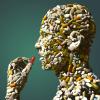They are very careful not to mention the product in the paper and unfortunately I cannot get access to the full paper
Clin Cancer Res. 2008 Jan 15;14(2):607-11.
Herbal/Hormonal dietary supplement possibly associated with prostate cancer progression.
Shariat SF, Lamb DJ, Iyengar RG, Roehrborn CG, Slawin KM.Authors' Affiliations: Department of Urology, University of Texas Southwestern Medical Center, Dallas, Texas, Scott Department of Urology, and Department of Molecular and Cellular Biology, Baylor College of Medicine, Houston, Texas.
Background: Patients seek herbal/hormonal dietary supplements (HHDS) to prevent and/or solve health and aging issues. After two men developed an unusual course of clinically aggressive prostate cancer within months of starting daily consumption of the same HHDS product, we investigated the effect of this product on prostate cancer progression. Methods: We evaluated serum levels of total testosterone, luteinizing hormone, and follicle-stimulating hormone and screened prostate biopsy and metastatic specimens for androgen receptor protein expression and mutations. We did hormone analyses and capillary electrophoresis. We tested the effect of the HHDS product on androgen receptor-negative (DU-145 and PC-3) and androgen receptor-positive (LNCaP) human prostate cancer cell lines. RESULTS: Both patients had low hormone levels. The androgen receptor was expressed in all primary and metastatic prostate cancer tissues and no mutations were identified. Hormone analysis revealed that the HHDS contained testosterone and estradiol. The HHDS product was a more potent dose-dependent stimulator of cancer cell growth than testosterone both in androgen receptor-negative and receptor-positive cell lines. Blocking experiments with increasing concentrations of bicalutamide did not prevent the HHDS product-stimulated growth. We filed an adverse event report with the Food and Drug Administration who issued a warning letter. The manufacturer responded by removing this HHDS product from the market. CONCLUSIONS: The HHDS product contained one or more endocrinologically active tumor-promoting components that had cellular androgen receptor status-independent activity. The HHDS product exhibited potent prostate cancer growth stimulatory activity that was more powerful than that of testosterone, independent of the androgen-receptor status of prostate cancer cells, and resistant to antiandrogen blockade.
PMID: 18223237 [PubMed - in process]
prostatehealth.org.au lists the ingredients of the suspected product
The labeled ingredients included 60 mg of a proprietary blend of six testosterone precursors (androstenediones and androstenediols), 100 mg of the aromatase inhibitor-like flavinoid chrysin, and 100 mg of elk velvet antler per serving.
I have always been super cautious in recommending androgenic hormones or androgenic-like hormones to the aged population. Androgens, of course, are steriods that act as cellular growth promoters.
Read prostatehealth.org.au for more info
Edited by zoolander, 30 January 2008 - 03:57 AM.
















































